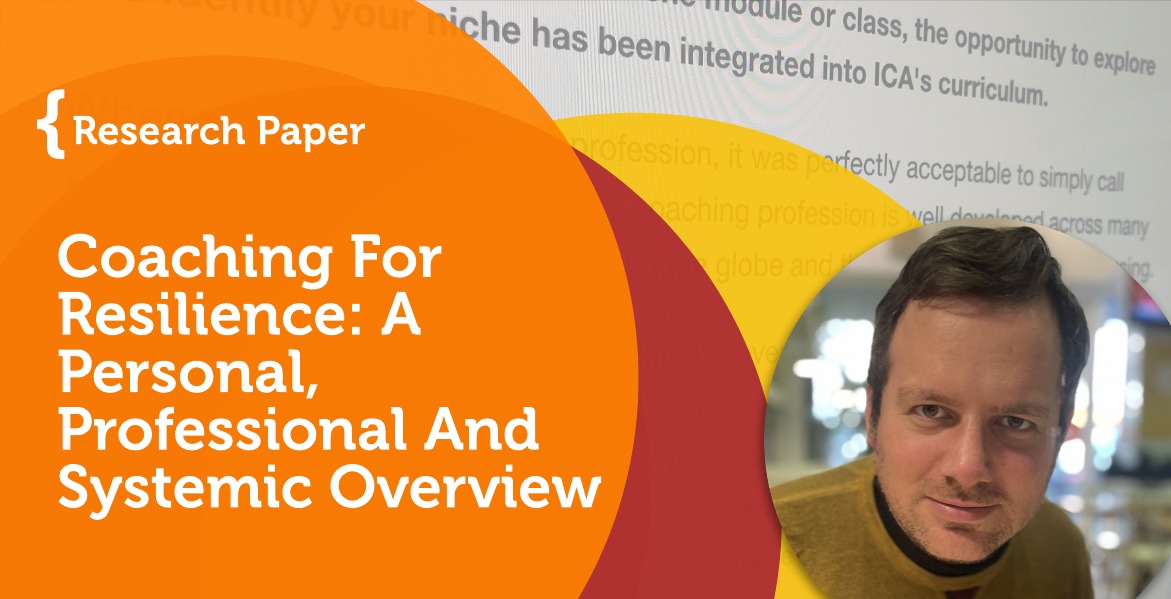 Research Paper By Diego Nannicini
Research Paper By Diego Nannicini
(Executive, Resilience, Transition Coach, CHINA)
 Introduction
Introduction
The first time I heard the word“resilience” was when I had just started studying material science in high school. It was a rather confusing concept which I would only really understand while studying for my mechanical engineering bachelor. Little I knew that my personal resilience would enable me to go through major career, personal and health crises – not simply by jumping back on my feet as nothing happened, rather by keeping the memory of what hit me during the years.
During the research for this very paper, I have found many descriptions of “resilience” –many of which are a simplified version of its meaning as by material science such “as the ability to bounce back from stress”. However, I somehow relate more to the more exact definition as: “the ability that a piece of material has of absorbing an impact, by also partially deforming, yet without breaking”. I prefer this definition because it includes the “memory part” i.e. that the piece remains deformed rather than simply bounce back like a spring. In the human mind and experience space, this can be a metaphor for the learnings that come from failure, or going through a crisis, rather than simply going back to a previous pristine state.
It was my resilience that made me go through brain tumor surgery and other treatments, can I say that I was not “(de)formed” by the experience, and I simply went back to my previous state? Surely not: I am a living, and fully self-aware, an example of neuroplasticity since I actually had to rewire my brain to a better functioning one after part of it was removed.
It is only with hindsight that I know it was my resilience that made me go through all those struggles and some career ups and downs. Specifically, according to Carole Pemberton’s model(Pemberton, 2015), I relied on my:
Of course, I didn’t know it when I was dealing with my own tough situations, I just thought I was optimistic and action-driven.
Given that, when I was facing those crises, I was mostly not aware of the inner strengths I was using, so I had to use much more energy than required, by mostly losing the other 3 components of Pemberton’s model:
Thus I am now committed to offering to my coaching clients a system to rely on the support of their own – may be temporarily lost, or maybe never tested – resilience.
The objective of this paper is to give an overview of resilience in coaching, having already covered my personal experience around it, I will first define what resilience is and isn’t for the individual client and how systemic thinking is involved in the bigger picture.
What resilience is in the context of coaching
The American Psychological Association defines resilience as “the process of adapting well in the face of adversity, trauma, tragedy, threats or significant sources of stress — such as family and relationship problems, serious health problems or workplace and financial stressors.”
A China operating Australian coach and trainer for “mental toughness” (another name for resilience), who I had the luck of interviewing defines resilience as our ability to cope, recover and adapt to stress, pressure, and challenges.
We can easily state that resilience is required in life, most managerial jobs, and by coaches themselves who might often be tested in their capabilities and self-confidence.
From my various readings for this paper, and personal experience comes out that resilience is something we all are born with but somehow might have it tested from time to time with the process of, at first, losing it then recovering and enhancing it while facing adversities. While most of us, especially the recruiters and many coaching clients in Asia, look at the most successful individuals as candidates for a job or coaches; many successful people (excluding the leaders e.g. the founders of big companies) seldom had their resilience tested, hence they are at risk of easily losing it while facing some difficulties: these are perfect coaching clients since they have the confidence and incentive to recover their resilience, together with the willingness to pay a coach for it.
The CoVid crisis has shown also the system and societal aspect of resilience: less individualistic societies performed much better in containing the spread of the virus and had made also sure that the economic fallout on the weakest part of their societies could be somehow contained. Citing again the Australian coach, I interviewed: resilience must be built also in the system the individual operates in thus, involving systemic thinking approaches.
What resilience isn’t
Being resilient doesn’t mean that a person won’t experience difficulty or distress. Like the piece of material, I used earlier for my engineer definition of resilience, we also have to absorb the shock and remain marked by it (learn) to go on and increase our resilience.
Like building a muscle, increasing our resilience takes time and intentionality.
The importance of building resilience
Since my childhood many secular changes happened, this is not to complain but simply to report how we constantly live in a VUCA world (Volatile, Uncertain, Complex, and Ambiguous).
When I was a child the world was split into 2 main blocks on the verge of a nuclear war when in primary school the Berlin Wall fell together with the communist block and the flamboyance of the 1980s in Italy; started a period of various “humanitarian wars” and a state of the constant economic crisis that seemed like swallowing the future of my generation, surely cost my father his job 2 or 3 times.
My second day at university was September 11th, 2001 when I thought I was seeing the same horror movie on each TV channel with airplanes crashing in skyscrapers.
China was on the rise and it was scary because it is so different and was threatening the usefulness and values of the west, I now happily live in Shanghai.
The point being resilience is also required to face transitions, which is even more of paramount importance in these CoVid times that are triggering massive lay-offs: loss of resilience is a common theme especially for more senior laid-off workers who feel the frustration of having lost a good role at an age where (they feel) it’s difficult to reinvent themselves or re-enter the market.
In the context of business, losing and rebuilding resilience of employees and teams is becoming more and more obvious due to research projects carried out by many leading institutions, and it’s going beyond being not only a coaching/medical topic investigated by e.g. the Institute of Coaching of the McLean Medical School affiliated to Harvard University (Institute of Coaching Mclean, Harvard Medical School, 2020), but it’s also being studied for its impact on business performances by e.g. Harvard business school (Gerdeman, 2019).
According to (Waters, 2020) there is a massive human and business toll due to stress and loss of resilience with roughly 120,000 premature deaths per year just in the USA and 5 to 8% of the total annual healthcare cost. While building resilience can create a buffer and even result in added profit for a company thanks to the increased productivity(Gerdeman, 2019).
Systemic thinking implications
Whether it’s family and friends for pure life issues, or all these plus managers and colleagues for work-related issues; systemic thinking can play a major role, either negative or positive, in the resilience of both individuals and groups (purely personal and/or work-related).
The first normal reaction to a crisis or mishap is getting scared and finding someone or something to blame: the economy, the virus, the spouse, the government, HR, suppliers, so on and so forth.
What if instead, those “villains” became partners in dealing with our own issues?
As I mentioned earlier countries whose societies are less individualistic, more often the Asian ones had performed much better with dealing with the CoVid crisis: at first by having each component of the societies feeling responsible for everyone else’s safety and wellbeing, while feeling taken care of by others too.
Ultimately building a resilient societal system will inevitably result in each of its members becoming more resilient. This does not mean that resilience shall be outsourced to people around us, on the contrary, it implies being a responsible member of the system to create a safety net for others, and in turn, for ourselves in those moments when we are really incapable of being self-sufficient(JIM DETHMER, 2014).
This approach requires a “leading by example” attitude, is not a form of enforcement if any of the members fall out of the agreement.
Now, this somehow is utopian, nevertheless, coaching can allow the individuals to start going in the direction of being aware of the importance of moving toward this idealistic system, at least it can enable them to identify its value and how to move from the normal fear/blame, whether towards others or self, a pattern that is embedded in our primordial brain which is evoked every time we are in danger(JIM DETHMER, 2014).
Conclusion
This paper covered my personal experience and definition of resilience; the importance of building resilience and its connection with system thinking.
I will cover the more practical side of coaching for resilience in my coaching model (Nannicini, 2021).
Bibliography
Gandur, S. K. (2020). The superpower of Resilience: Executive coaching, for resilience, builds honest, hopeful leaders & organizations! Retrieved from LinkedIn: https://www.linkedin.com/pulse/superpower-resilience-executive-coaching-builds-honest-sule-kutlay/
Gandur, S. K. (2020). Resilient, With a Cause: Power of Purpose in Resilience. Retrieved from LinkedIn: https://www.linkedin.com/pulse/resilient-cause-power-purpose-resilience-sule-kutlay-gandur/
Pemberton, C. (2015). Resilience: A practical guide for coaches. Maidenhead, Berkshire, England: McGraw-Hill Education – Open University Press.
Institute of Coaching Mclean, Harvard Medical School. (2020). Top Resilience Tips. Retrieved from Institute of Coaching Mclean, Harvard Medical School: https://instituteofcoaching.org/blogs/top-resilience-tips
Waters, S. (2020). Why Resilience is a Top Skill Needed in Today’s Workplace. Retrieved from BetterUp: https://www.betterup.com/en-us/about-us/blog/how-to-build-resilience-why-resilience-is-a-top-skill-for-the-workplace
Gerdeman, D. (2019). Distressed Employees? Try Resilience Training. Retrieved from Harvard Business School Working Knowledge: https://hbswk.hbs.edu/item/distressed-employees-try-resilience-training
JIM DETHMER, D. C. (2014). The 15 Commitments of CONSCIOUS LEADERSHIP A new paradigm for sustainable success.
Nannicini, D. (2021). Coaching for resilience: model. Shanghai.